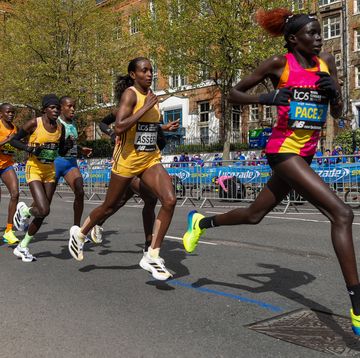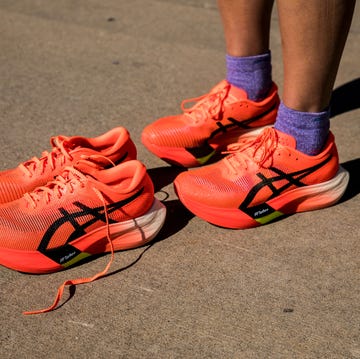Yale researcher Chirag Parikh, M.D., Ph.D., didn’t intend for his study to imply that marathon runners are trashing their kidneys. But that’s what the headlines have said.
At first, he and his research team mainly wanted to understand more about why sugarcane workers in tropical climates like Nicaragua had developed an epidemic of chronic kidney disease. One theory held that ongoing physical stress in hot temperatures played a role.
So, he had an idea: recruit runners at the 2015 Hartford Marathon. “Marathon running gives you a very good human model of physical stress and heat stress in a very controlled setting, where you can study people, their baseline health, and when they recover,” he says.
Parikh signed up 22 runners for the October 2015 event (at which temps hovered around 62 degrees). The week beforehand, immediately afterward, and 24 hours later, he tested their kidney health by checking a few different compounds in their blood and urine. The results of their study were published online March 28 by the American Journal of Kidney Disease.
The first thing to note: The runners had completed an average of five previous marathons. At the start of the study, their kidney health was, in Parikh’s words, “absolutely pristine.” But even he was a bit taken aback by the readings immediately after they completed 26.2 miles.
Serum creatinine, a compound typically used to assess kidney function in doctors’ offices, reached levels indicative of stage I acute kidney injury in 82 percent of the runners. However, Parikh and other experts point out, this number doesn’t provide a complete picture of kidney health. The compound forms when your muscles break down, and your kidneys typically filter it from your bloodstream.
RW IN YOUR INBOX: Get the latest news delivered to your email each day.
High levels can tell you that your body’s creatinine production is outpacing your kidneys’ ability to clear it—but not the root cause, Parikh says. For instance, dehydration can also cause high creatinine levels. Even just having increased muscle mass can contribute to abnormal readings, says Houston Methodist primary-care sports-medicine physician Vijay Jotwani, M.D.
To detect kidney disease earlier, researchers like Parikh have pinpointed several new biomarkers of kidney injury. While they aren’t yet routinely measured in U.S. patients, they’re frequently assessed in studies and some have been approved in other countries. These biomarkers include proteins that, when found in urine, point more directly to inflammation, ischemia, and structural damage to the cells in your kidneys.
Levels of these biomarkers were also high among most of the runners, the findings show. What’s more, the study authors also took a close look at runners’ urine under a microscope, checking for evidence of kidney-cell debris. In three-fourths of the runners, this test came back positive. “This tells you that there is damage to the nephrons,” Parikh says. “So there is no question that this is not just a dehydration injury, there is actual death of the kidney cells that we are seeing.”
What’s behind this damage? While running, your body diverts blood from internal organs like your kidneys to your hard-working muscles. In fact, only about one-fourth the amount of normal blood may reach your kidneys during strenuous exercise, depriving them of essential oxygen and nutrients.
Heat stress—which could occur due to raised body temperatures, even when it’s not that steamy outside—might also contribute, Parikh notes.
Fortunately, all the runners experienced a complete reversal of these abnormalities by the next measurement, taken the day after the race. This suggests that, for most healthy people, any implications would be minor, say Parikh and Sung Jo Kim, M.D., chief of nephrology and hypertension at Brookhaven Memorial Hospital in Patchogue, New York, and also a marathoner.
“The thing that we do not know is—are there subgroups of runners where some of them may not recover fully, and these injuries may leave small scars in the kidney? And with these scars, would you get chronic kidney disease after many many years of marathon running?” Parikh says.
Other experts acknowledge that’s possible. “Let’s say the kidneys recover 99 percent of the time,” says marathoner and nephrologist Peter Nguyen, M.D., of Houston Methodist Hospital. “If a runner or a long distance athlete races 10 times a year, you can see that over the course of a few years there is potential to lose a few percentage points of kidney function.”
The risk would likely be greater in people with other risk factors, such as high blood pressure, diabetes, or a personal or family history of kidney disease, Parikh notes. And with age, too, the kidneys’ ability to repair diminishes—though it’s not clear at exactly what year the balance would start to tip toward long-term kidney damage.
Most people healthy enough to run marathons likely aren’t at high risk, Parikh says. And he and other physicians note that exercise in general, and running in particular, has plenty of other perks.
“I would still recommend that my patients take up running as part of an overall healthy lifestyle,” Dr. Jotwani says. “However, this information may potentially mean that someone who is prone to kidney disease—a diabetic, for example—should take caution and have their kidney function monitored closely by their physicians if they are running marathons.”
All runners can protect their kidney and overall health by hydrating properly—in most cases, this means drinking when you’re thirsty, Dr. Kim says. (Check out these crucial tips for staying hydrated while running.) Also, avoid non-steroidal anti-inflammatory medications, such as ibuprofen and naproxen, prior to races.
These drugs work by inhibiting the function of prostaglandins, compounds that plays a role in inflammation but also protects blood flow to the kidneys. “So on top of the already decreased blood flow during running by shunting of blood to skeletal muscles, NSAIDS could further decrease blood flow, placing the kidneys at risk of potential injury,” Dr. Kim says.
NSAIDS also cause intestinal irritation when taken while running, Dr. Jotwani points out. If you feel achy, he advises taking Tylenol or acetaminophen instead—it relieves pain via a different mechanism. (Make sure you are using the right pills to pop for any ailment.)
As for Parikh, he hopes to continue studying the issue, so he doesn’t leave the endurance-sports community hanging. “After studying this it has become obvious that we need to complete the story here,” he says. “Now we feel that we owe it to the runners.”

Cindy is a freelance health and fitness writer, author, and podcaster who’s contributed regularly to Runner’s World since 2013. She’s the coauthor of both Breakthrough Women’s Running: Dream Big and Train Smart and Rebound: Train Your Mind to Bounce Back Stronger from Sports Injuries, a book about the psychology of sports injury from Bloomsbury Sport. Cindy specializes in covering injury prevention and recovery, everyday athletes accomplishing extraordinary things, and the active community in her beloved Chicago, where winter forges deep bonds between those brave enough to train through it.













